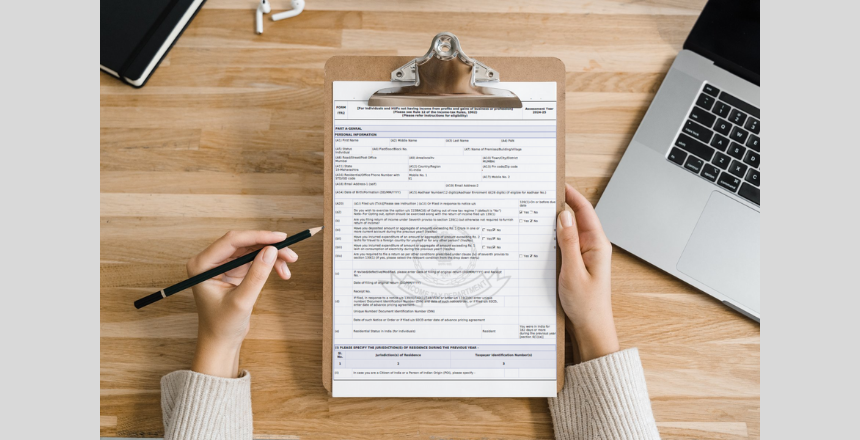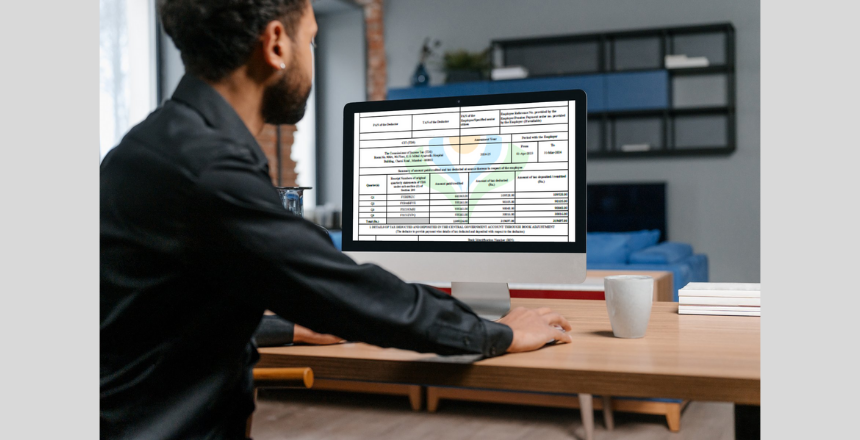
Filing income tax returns (ITR) is a challenging process for every Taxpayer in India. Whether you are Salaried Individual, a Professional, a Freelancer, or a Business Owner, submitting an accurate and timely ITR ensures you comply with Tax Laws and avoid penalties. Many Taxpayers often make some common mistakes when filing their Returns, which leads to delays, fines, or even legal issues.
Understanding these common mistakes and how to avoid them is essential for smooth Tax Filing.
In this blog, we will walk you through the top 10 common mistakes to avoid when filing Income Tax Returns, ensuring you file without any hassle or penalties.
Common Mistakes to Avoid When Filing Income Tax Returns
1. Failing to File on Time

If you miss to file in time, you may face:
- Late filing penalties: If you file after the due date but before December 31st, you can incur a late filing fee of ₹1,000 for income below ₹5 lakh and ₹5,000 for income above ₹5 lakh.
- Interest: You may also be liable for interest under Section 234A at the rate of 1% per month on the amount of tax due.
- Loss of exemptions or deductions: Certain exemptions and deductions may not be available if the return is filed after due date.
To avoid this, always keep track of deadlines, and if needed, file an extension request.
Table of Contents
Toggle2. Incorrectly Selecting the ITR Form

Income taxpayers in India need to choose the right ITR form based on their income sources. There are different ITR forms, such as:
- ITR-1 (Sahaj): For Salaried Individuals or Pensioners with one House Propety and income up to ₹50 lakh.
- ITR-2: For Salaried Individuals with more than one House Property or Individuals with multiple sources of income including capital gains.
- ITR-3: For Self-Employed Professionals or those with a source of Business Income.
- ITR-4 (Sugam): For small Businesses or Professionals opting for the Presumptive Taxation scheme under Section 44ADA.
Selecting the wrong form can result in a rejection of your return or additional scrutiny. Ensure that you choose the correct form based on your income sources and eligibility criteria. Always double-check the form before submission to avoid this mistake.
3. Missing Income from Other Sources

Many taxpayers forget to report income from other sources, which may include:
- Interest income: From Savings Accounts or Fixed Deposits with Financial Institutions or Bonds.
- Dividend income: From Shares or Mutual funds.
- Rental income: If you receive rent from your own property.
Missing out or omitting any of these incomes can lead to discrepancies in your return, triggering penalties or scrutiny from the Income Tax Department. Ensure that you report all Sources of Income, even those that you might think are insignificant.
4. Incorrectly Claiming Deductions
One of the main reasons people file returns is to claim deductions under Section 80C and other sections like 80D, 80G, and 80E. However, a common mistake is incorrectly claiming deductions, which could lead to penalties. Common mistakes include:
- Claiming deductions without proper documentation (e.g., claiming tax benefits on insurance premiums without providing valid receipts).
- Claiming deductions on ineligible expenses (e.g., investments not qualifying under Section 80C).
- Not considering the limit on the maximum deductions allowed for each section. For example, under Section 80C, the maximum deduction is ₹1.5 lakh, but taxpayers sometimes exceed this amount.
To avoid this mistake, make sure you are aware of the maximum limits for each deduction and retain valid documents as proof of investment or payment.
5. Not Verifying TDS or Tax Paid
Taxpayers often make the mistake of not cross-checking the Tax already paid or Tax Deducted at Source (TDS), which is deducted by Employers, Banks, or other entities. Not accounting for the correct TDS can lead to:
- Underreporting of Tax paid, leading to a demand for taxes after filing.
- Discrepancies in the ITR, especially if the TDS does not match the actual tax that has been deducted and reported.
To avoid this, you must download your Form 26AS from the Income Tax Department website, which contains details of the TDS deducted on your behalf. Reconcile this information with your Income Sources to ensure there are no differences.
6. Incorrect Bank Account Details
When filing your income tax return, the Bank Account details you provide are crucial, especially for Tax Refunds. Providing incorrect bank account details can cause:
- Delays in Refunds: Your Refund will not be processed if the Bank Account details are incorrect.
- Rejection of the return: In some cases, incorrect or incomplete Bank details may lead to the rejection of yourReturn.
Make sure to enter the correct Bank Account number, IFSC code, and other necessary details. Also, ensure that the Bank Account is in your name and is active to avoid complications.
7. Not Reporting Foreign Income
Indian Residents who have foreign income (such as income from investments abroad or salary received in foreign currency) must report it in their income tax returns. Not reporting foreign income can attract penalties or legal action. You should:
- Report Foreign Income under the appropriate section of the ITR form.
- Convert Foreign Income into Indian Rupees using the appropriate exchange rate as specified by the Tax Department.
If you are not sure about how to report Foreign Income, it is always wise to consult an experienced Tax professional.
8. Underestimating Taxable Capital Gains

One more common mistake is the incorrect calculation of Capital Gains Tax. If you have sold Stocks, Mutual Funds, or Property whether movable or immovable, you need to calculate:
- Short-term capital gains (STCG): If the asset is sold within a period of one year (for Stocks, Mutual Funds, etc.), and within two years for immovable property.
- Long-term capital gains (LTCG): If the asset is sold after the period of one year (for Stocks, Mutual Funds, etc.), and two years for immovable property, subject to specific exemptions.
Many taxpayers either forget to factor in indexation benefits for long-term capital gains or fail to consider tax exemptions, such as Section 54 for the sale of property.
Make sure you calculate capital gains correctly and use any exemptions or deductions available under the Income Tax Act to reduce your taxable income.
9. Incorrectly Claiming HRA (House Rent Allowance)
House Rent Allowance (HRA) is one of the most common sources of deductions for salaried individuals. However, claiming incorrect HRA is a frequent mistake. For example:
- Claiming HRA when you don’t pay rent.
- Not keeping the necessary Rent receipts or failing to meet the conditions of eligibility, such as living in a rented accommodation.
- Failing to declare other Rental Income received from tenants.
Ensure you have proper documents (like rent receipts and rental agreements) and only claim HRA deductions if you are eligible.
10. Not Reconciliation of Income with Form 16

Form 16 is a certificate provided by employers detailing the Salary earned by an employee, and the TDS deducted further.
Most of the taxpayers make the mistake of not reconciling their income with Form 16. The discrepancies may arise due to:
- Salary increments or bonuses not properly accounted for.
- TDS figures that do not match the actual TDS deduction.
Before submitting your ITR, compare your Total Income with the information provided in Form 16, and check if the TDS deducted matches with the amount reflected in your Form 26AS.
Some more common mistakes to avoid when filing Income Tax Returns
- Incorrect Personal Details
- Mistake: Filing returns with incorrect details such as name, PAN number, date of birth, or contact information.
- How to Avoid: Always cross-check personal details with the PAN card and ensure the correct data is entered in the ITR form.
- Failure to Verify the ITR
- Mistake: Filing the ITR but failing to verify it through OTP, Aadhaar, or sending a physical copy of ITR-V to the CPC office.
- How to Avoid: After filing, ensure to complete the verification process. You can verify the ITR online via Aadhaar OTP, or you can print and send the ITR-V to the Income Tax Department within 120 days.
- Underreporting or Overreporting Taxable Income
- Mistake: Misreporting income to reduce taxes or inadvertently overreporting to avoid penalties.
- How to Avoid: Accurately calculate all sources of income and ensure that the amounts are correctly entered into the appropriate fields.
- Incorrect Calculation of Taxable Income
- Mistake: Incorrectly calculating taxable income after deducting exemptions and applying tax rates.
- How to Avoid: Use tax calculators and cross-check your taxable income after considering exemptions, deductions, and rebates.
- Not Carrying Forward Losses
- Mistake: Not carrying forward business or capital losses, which can be set off against future income.
- How to Avoid: Report your losses while filing returns, ensuring that you carry forward eligible losses as per the Income Tax Act.
- Claiming Multiple Tax Benefits for the Same Expense
- Mistake: Claiming deductions or exemptions twice for the same expense, like claiming a deduction for the same insurance premium under both 80C and 80D.
- How to Avoid: Be cautious while claiming deductions and ensure you’re not duplicating claims for the same expenditure under different sections.
- Not Checking the Pre-filled Data
- Mistake: Ignoring the pre-filled data in the ITR form and assuming it is correct.
- How to Avoid: Always verify pre-filled data in the ITR form, as it may not always be accurate. Update or correct the information as needed.
- Failure to Reconcile TDS and TCS
- Mistake: Not cross-checking the Tax Deducted at Source TDS and Tax Collected at Source TCS amounts from Form 26AS or failing to reflect these amounts in the ITR. This can result in excess tax being paid or under-reporting of tax credits, leading to issues with the tax authorities.
- How to Avoid: Reconcile the amounts with TDS or TCS certificates provided by the Tax Deductors or Tax Collectors.
- Failure to Report GST Liabilities (For Business Owners)
- Mistake: For individuals with businesses, failing to report GST liabilities and returns properly in the ITR. Incorrect reporting of business-related tax liabilities can lead to penalties and additional scrutiny.
- How to Avoid: When filing your ITR, ensure that the details of your business income and expenses (including GST-related amounts) align with the figures reported in your GST returns.
- Not Updating the Address
- Mistake: Failing to update your current address with the tax authorities. This results in Communication delays or missed notices from the Income Tax Department.
- How to Avoid: Update the address details in your personal details section of the Income Tax Portal and update the details in PAN database by applying for Corrections in PAN data.
- Wrong Tax Payment Details
- Mistake: Reporting incorrect or missing details of advance tax payments or TDS deducted.
- How to Avoid: Cross-check your Form 26AS or TDS certificates and enter the correct details for taxes already paid.
- Not Keeping Track of Changes in Tax Laws
- Mistake: Failing to stay updated on the latest changes in tax laws, such as new deductions, exemptions, or tax slabs.
- How to Avoid: Keep yourself updated on the latest tax changes and reforms or consult a tax expert to ensure compliance.
By being mindful of these common mistakes when filing Income Tax Returns, taxpayers can avoid penalties, interest, and unnecessary complications.
- Incorrect selection between Old Regime and New Regime
- Mistake: Incorrectly selecting between the old and new tax regimes can lead to higher tax liabilities or missed savings. Taxpayers may opt for the new regime without fully understanding that they lose deductions like 80C or HRA, or they may choose the old regime without accounting for simpler tax rates under the new one. Additionally, failing to file Form 10IE when switching to the old tax regime can result in penalties, as this form is mandatory for individuals opting for the old regime.
- How to Avoid: To avoid this, carefully assess your financial situation to decide on opting between the regimes, by default new regime is applicable. Hence, ensure proper filing of Form 10IE, if you opt for old regime with in deadline to avoid complications.
Conclusion
There are many other common mistakes which are done when Filing a Return, same can be clarified by getting some advice from an expert Tax Professional.
Filing Income Tax Return can be a complex process, but by avoiding those common mistakes can make it much easier. By staying organized, double-checking your information, and keeping track with deadlines, you can ensure that your Tax Filing is accurate and compliant with the Income Tax law. Remember, these mistakes in your ITR can lead to penalties, delays in Refunds, and even Legal issues, so it is always best to be cautious.
If you are unsure about any aspect of your Income Tax Filing, consider consulting a Professional Tax consultant or a Chartered Accountant who can help you navigate the process smoothly.
By being cautious, you will be able to enjoy a stress-free Tax Filing experience and stay on the right side of the Tax Authorities.

Thanks sir good information sir
Thank you for sharing such an informative article.